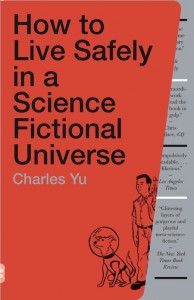
The narrative is the tale of Charles Yu, a Charles Yu who supposedly lives in an alternate universe in which “science” has been substituted with “science fiction.” Everything that can exist in science fiction, exists in this world: emotive computer programs, time machines, futuristic sidekick dogs. And one day, thanks to a time machine, Charles Yu meets Charles Yu and becomes stuck inside a time loop. Inside this time loop, Yu writes a book titled, How to Live Safely in a Science Fictional Universe.
The book is meta on a new scale.
But Yu’s idea of time travel is even more trippy when you get down to it, because in this universe, time travel does not require a DeLorean. Here, all you need is your mind. To travel through time is to alter your perception of time. With Déjà vu, we seem to be able to remember the present. Yu poses: if we can remember the present, why can’t we re-experience the past?
And that’s what we do everyday. We re-experience, that is we travel to, the past in our minds, replaying our most heart-wrenching memories over and over again. And sometimes we get stuck in a loop of our own making, reliving our mistakes when we should be embracing the anxiety and the unknown of our futures.
It is a tone poem. It is an exploration of the almost cosmic bond between the destinies of fathers and sons. But it’s also a fun riff on science fiction stories.
In the end, what the book is to me, I think, is a close representation of how our consciousness lives somehow outside the flow of time and only understands its passage when it tries to describe it.
“It collapses onto itself, like the present,” writes Yu, “which only appears when you think about it, like the text of a book.”